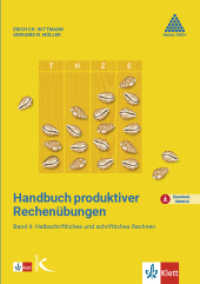Full Description
Sociocultural environments prompt us to notice and mark certain differences over others. This book investigates five paradoxes in the discourses and practices around such differences: the paradox of mixing, standardization, narrative, proximity, and tolerance. Drawing on the notion of unit thinking, it explores how perceived differences emerge fluidly in specific contexts. Through critical analyses of race studies, language education, global education/study abroad, and volunteer/service work, the book examines how these fields build on or capitalize on pre-conceived differences. It opens up discussions for new understandings of differences that challenge essentialist framings and inform alternative practices.
Contents
Introduction: The Paradox of Difference
Chapter 1. The Paradox of Mixing and Border Crossing: A Necessary Reliance on Unit Thinking
Chapter 2. The Paradox of Standardization: Normative Unit Thinking and Its Simultaneous Homogenization and Hierarchical Differentiation
Chapter 3. The Paradox of Narrative: The Self-Fulfilling Prophecy of the New and the Different
Chapter 4. The Paradox of Proximity: Subject Position Proximity and the Oppositional Articulation of Difference
Chapter 5. The Paradox of Tolerance: Cultural Relativism, Othering, and "Seeing Difference in Similarity"
Conclusion: Challenging Paradoxes of Difference toward Post-Unit Thinking
Glossary
References
Index






